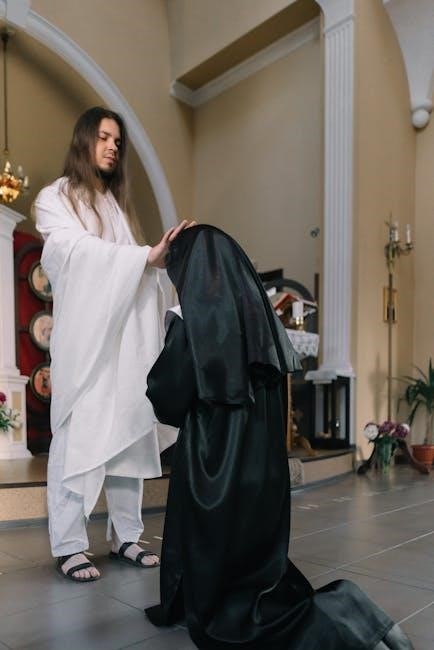
First Holy Communion preparation involves structured lessons, prayer, and spiritual readiness, helping children understand the Eucharist’s significance and fostering a lifelong connection with faith.
1.1 Historical Significance of First Holy Communion
The First Holy Communion holds profound historical and spiritual significance, rooted in the Last Supper where Jesus instituted the Eucharist. It is a sacrament that connects believers to Christ’s sacrifice and resurrection. Historically, the Eucharist has been central to Christian worship, with early Church councils defining its doctrine. Over centuries, the ritual has evolved, yet its essence remains unchanged. The practice of children receiving their First Communion symbolizes their initiation into the Church’s communal life. This tradition emphasizes faith formation and spiritual growth, reflecting the Church’s mission to nurture believers from a young age. The historical context underscores the Eucharist’s role in uniting the faithful across generations, making it a cornerstone of Christian identity and practice.
1.2 The Importance of Preparation for First Holy Communion
Preparation for First Holy Communion is crucial for children to grasp the sacrament’s meaning and significance. It fosters spiritual growth, helping them understand the Eucharist as a source of grace and strength. Through structured lessons, prayer, and reflection, children develop a deeper relationship with Christ. This preparation also involves learning about the Mass, sacraments, and Church teachings, creating a strong foundation for their faith journey. Families and educators play vital roles in guiding children, ensuring they approach the sacrament with reverence and readiness. Proper preparation not only enriches the child’s experience but also strengthens their commitment to living a faith-centered life; It is a pivotal moment in their spiritual development, laying the groundwork for lifelong participation in the Church’s liturgical life.
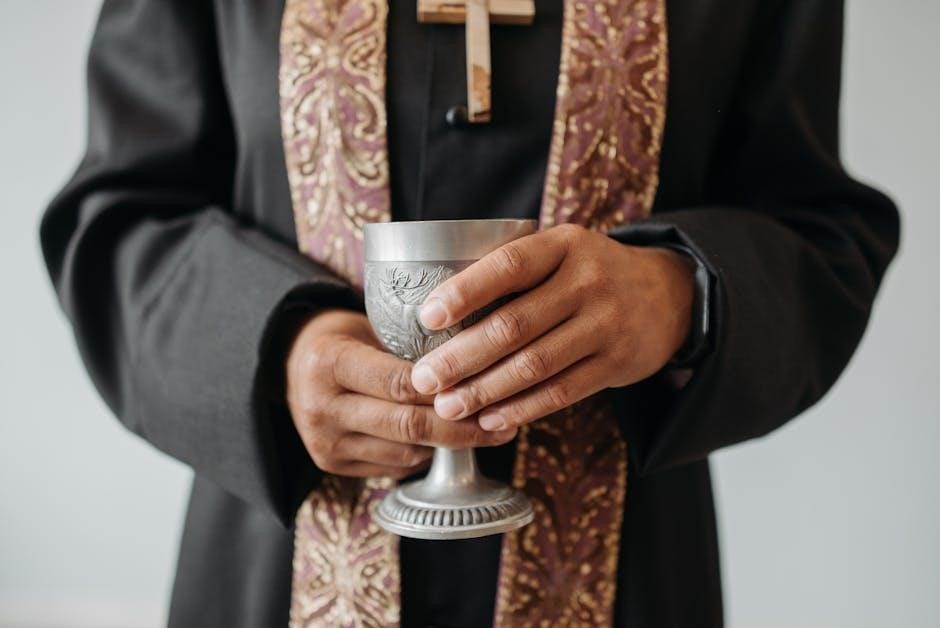
The Role of Lessons in First Holy Communion Preparation
Structured lessons provide essential knowledge about the Eucharist, Mass components, and rituals, preparing children spiritually and practically for their First Holy Communion.
2.1 Overview of Preparation Lessons
Preparation lessons for First Holy Communion are designed to guide children in understanding the sacrament’s significance. These lessons typically span several weeks, combining prayer, education, and practical activities. Children learn about the Eucharist, its connection to the Mass, and the importance of spiritual readiness. Sessions often include hymns, Scripture readings, and discussions on sacred vessels used in the liturgy. Family involvement is encouraged, with parents supporting their child’s journey through shared prayer and attendance at Mass. The lessons also emphasize the role of Adoration and the value of gratitude, helping children develop a deeper faith. These structured programs aim to create a meaningful and lasting experience for young participants as they prepare for this sacred milestone.
2.2 Structure of a Typical Preparation Program
A typical First Holy Communion preparation program is structured over several weeks, often seven, with weekly sessions for children and their families. Each session includes prayer, teachings on the Eucharist, and hands-on activities. Programs may also incorporate family prayer nights and retreats to deepen spiritual understanding. Some parishes organize preparation camps, offering immersive experiences with group discussions and reflections. Lessons are supplemented with guided materials, such as prayer books and PDF guides, to aid home study. The program culminates in final rehearsals and a closing Mass, ensuring children are spiritually and practically ready for their First Communion. This structured approach fosters a meaningful and transformative experience for participants.
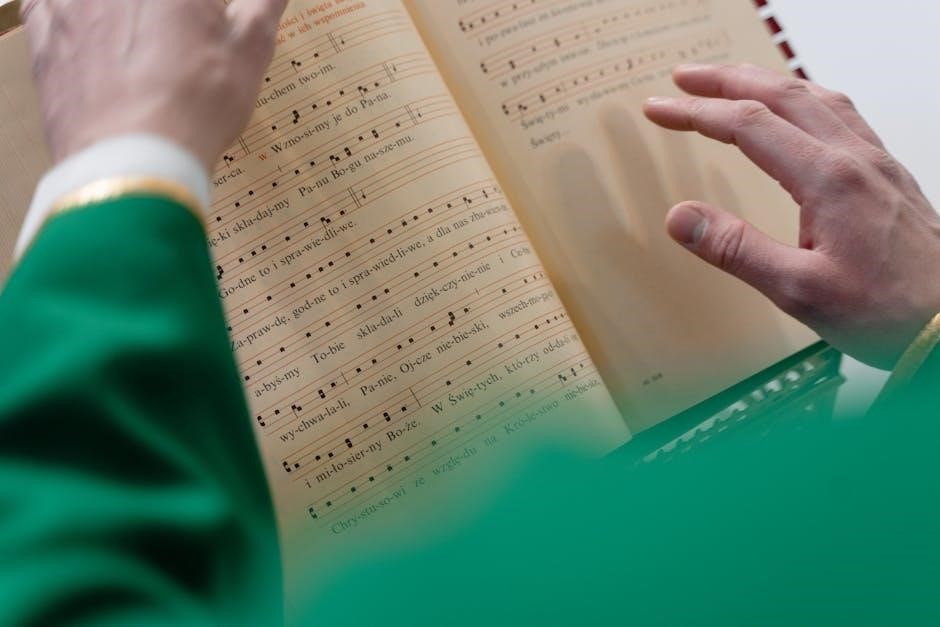
Key Concepts Taught in Preparation Lessons
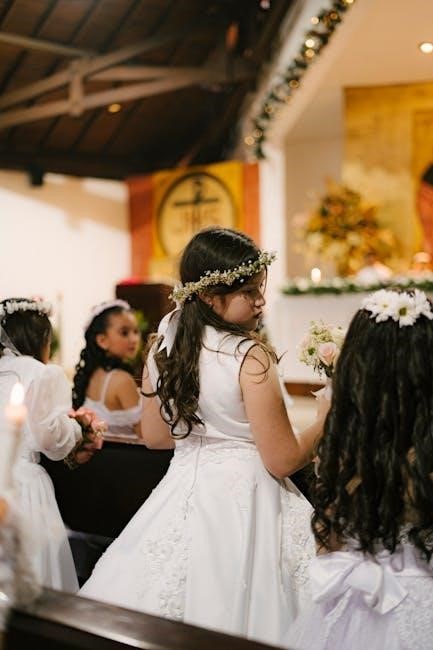
Lessons focus on understanding the Eucharist, the Mass, and sacred vessels, while fostering prayer and spiritual readiness for receiving Christ in the Holy Communion.
3.1 Understanding the Eucharist
The Eucharist is a sacrament central to Catholic faith, where bread and wine become the Body and Blood of Christ. It reflects Christ’s Last Supper and His command to “do this in memory of me.” Through the Mass, the Eucharist is celebrated, emphasizing unity with God and the community. Preparation lessons highlight the Eucharist as a source of spiritual nourishment and a deepening of faith. Children learn the significance of the Eucharist as a sacrifice, meal, and presence of Christ, fostering a lifelong appreciation for this sacred ritual. Understanding the Eucharist is foundational for First Holy Communion, enabling children to approach the sacrament with reverence and gratitude.
3.2 The Sacrament of the Eucharist
The Sacrament of the Eucharist is a central aspect of Catholic faith, where bread and wine become the Body and Blood of Christ through transubstantiation. Instituted by Jesus at the Last Supper, it represents His sacrifice and gift of life. In First Holy Communion preparation, children learn about the Eucharist as a source of spiritual nourishment and unity with God. Lessons emphasize the importance of reverence, prayer, and worthy reception. The Eucharist strengthens the bond between believers and Christ, fostering a deeper understanding of faith and community. Preparation materials, such as PDF guides, often include prayers, reflections, and explanations to help children grasp the sacrament’s meaning and significance in their spiritual journey.
3.3 The Mass and Its Components
The Mass is a sacred celebration where the Eucharist is central. It consists of key components: the Introductory Rites, Liturgy of the Word, Eucharistic Prayer, and Concluding Rites. Children learn the significance of each part, such as the Gloria, readings, Gospel, offertory, consecration, and communion. Preparation materials, like PDF guides, often break down the Mass into understandable sections, helping children appreciate its rituals and symbolism. Understanding the Mass deepens their reverence and participation, making the Eucharist a meaningful experience. Lessons emphasize the importance of prayer, singing, and active involvement in the liturgy, preparing them to fully engage in the celebration of the Mass on their First Holy Communion day and beyond.

Prayers and Rituals in First Holy Communion
Prayers like the Act of Contrition and Eucharistic prayers are central to preparation. Rituals such as the Final Blessing and Dismissal emphasize spiritual readiness and reverence.
Eucharistic prayers are central to the Mass, expressing gratitude and reverence for the sacrifice of Christ. They include thanksgiving, consecration of bread and wine, and invocation of the Holy Spirit. Children learn these prayers during preparation, understanding their role in the liturgy. The prayers reflect the Church’s belief in the Real Presence of Christ in the Eucharist. Practice includes reciting key prayers, such as the Our Father and the Lamb of God, fostering a deeper connection to the sacrament. These prayers guide the congregation in worship and prepare hearts for Communion. Learning them helps children participate fully in the Mass, enriching their spiritual experience and readiness for First Holy Communion.
4.2 The Act of Contrition and Its Significance
The Act of Contrition is a prayer expressing sorrow for sins, seeking forgiveness, and committing to amendment. It is a vital part of First Holy Communion preparation, fostering repentance and spiritual readiness. Children learn to recite it sincerely, understanding its role in reconciling with God and the Church. This prayer helps them acknowledge their imperfections and seek divine mercy, essential for receiving the Eucharist worthily. By practicing the Act of Contrition, they develop a habit of prayerful reflection, deepening their relationship with Christ. It complements other preparatory prayers, guiding them toward a purity of heart and mind, crucial for their First Holy Communion experience.
4.3 Prayers After Communion
Prayers after Communion are essential for reflecting on the Eucharistic experience, expressing gratitude, and seeking God’s guidance. These prayers help children deepen their spiritual connection and thanksgiving after receiving the sacrament. They are taught to pray for strength to live according to Christ’s teachings and to remain close to Him. Specific prayers, such as the Thanksgiving Prayer, are emphasized, focusing on humility and devotion. These moments of reflection reinforce the child’s understanding of the Eucharist’s transformative power.
By practicing these prayers, children learn to express their love and appreciation for the gift of the Eucharist. This practice fosters a lifelong habit of prayerful thanksgiving, enriching their relationship with Christ and the Church.
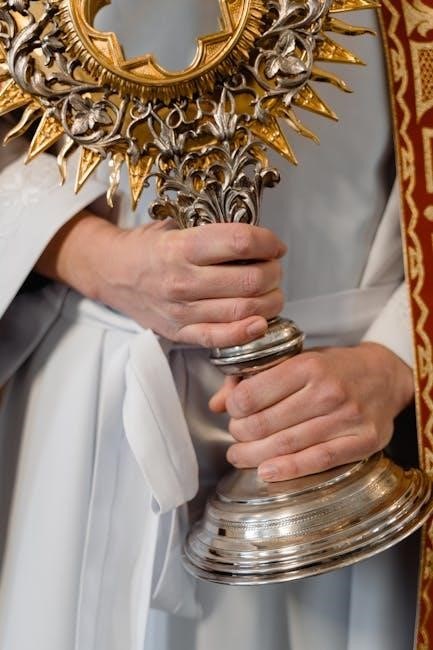
The Role of the Family in Preparation
Families play a vital role in preparing children for First Holy Communion through prayer, attending Mass, and discussing the sacrament’s significance at home, fostering spiritual growth together.
5.1 Involving Parents in the Preparation Process
Parents play a vital role in their child’s First Holy Communion preparation. They are encouraged to attend Mass regularly with their children, fostering a deeper understanding of the Eucharist. Families are also urged to engage in prayer and worship at home, creating a spiritual environment that complements formal lessons. Many programs provide resources for parents, such as prayer guides and discussion materials, to help them support their child’s journey. Active participation in retreats and preparation camps further strengthens family involvement. By modeling faith and reinforcing lessons at home, parents help their children develop a lifelong connection to the sacraments. This collaborative effort ensures a holistic and meaningful experience for the child.
5.2 Family Prayer and Worship
Family prayer and worship are essential in preparing children for their First Holy Communion. Parents are encouraged to create a prayerful home environment, fostering a deeper understanding of the Eucharist. Many resources, such as prayer guides and devotional materials, are available to help families incorporate faith into daily life. Regular attendance at Mass, Eucharistic adoration, and recitation of prayers like the Act of Contrition strengthen spiritual readiness. Families can also engage in thanksgiving prayers after Communion, reinforcing the child’s connection to the sacrament. By prioritizing faith and worship at home, families help their children develop a lifelong relationship with God and a meaningful appreciation of the Eucharist.
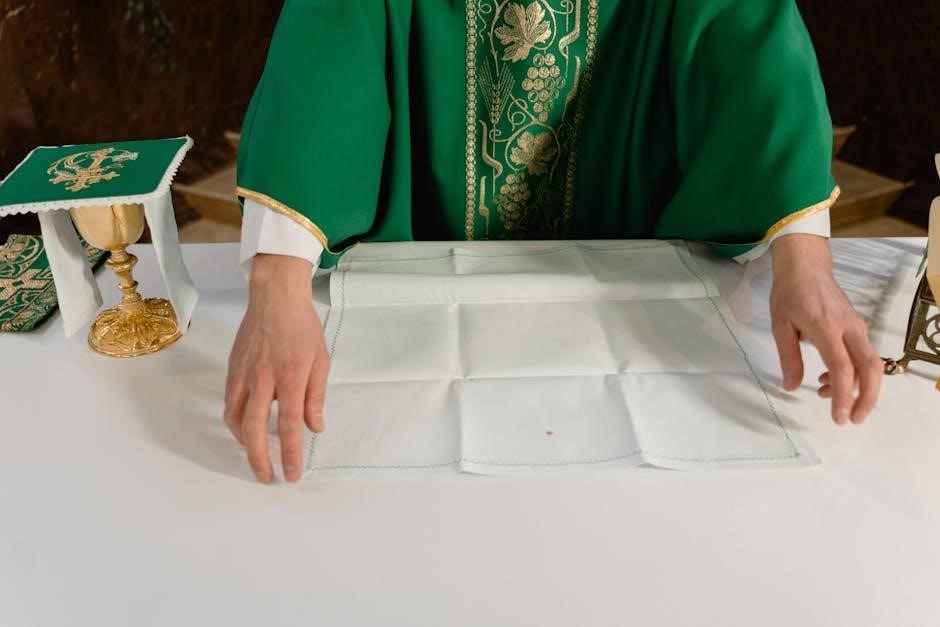
Resources for Preparation
Recommended prayer books, guides, and online PDF materials provide comprehensive support for First Holy Communion preparation, offering insights into the Eucharist and sacramental practices.
6.1 Recommended Prayer Books and Guides
Several prayer books and guides are available to aid in First Holy Communion preparation. Resources like the “First Holy Communion (A5 Booklet)” offer structured lessons and prayers in formats such as Word Doc, PDF, and text files. These guides often include Eucharistic adoration materials, hymns, and Scripture readings. Some focus on sacred vessels and Mass components, helping children understand liturgical elements. Practical tasks, such as practicing the “I Confess” prayer with partners, are also included. These resources provide a comprehensive approach to spiritual readiness, ensuring children grasp the Eucharist’s significance. They are invaluable for both home and classroom use, complementing formal lessons with personalized reflection and worship.
6.2 Online Resources and PDF Materials
Online resources and PDF materials are invaluable for First Holy Communion preparation, offering accessible and comprehensive guides. Websites provide downloadable booklets, such as the “First Holy Communion (A5 Booklet),” in formats like PDF, Word Doc, and text files. These resources often include structured lessons, Eucharistic prayers, and hymns, making them ideal for both home and classroom use. Many guides focus on the sacrament’s significance, with sections on sacred vessels, Mass components, and reflections. Some materials feature interactive elements, such as practicing the “I Confess” prayer or exploring Scripture readings. These online tools cater to diverse learning styles, ensuring children and families can engage deeply with the preparation process. They also offer convenience, allowing access anytime and fostering a meaningful journey toward First Holy Communion.

Retreats and Special Events
Retreats and special events, like the two-day camp at St. Francis of Assisi, provide a focused environment for reflection, prayer, and bonding, enriching the preparation journey.
7.1 The Role of Retreats in Preparation
Retreats play a vital role in First Holy Communion preparation, offering a focused environment for spiritual growth and reflection. These events, often held over several days, provide children with the opportunity to deepen their faith through prayer, group discussions, and activities tailored to their understanding of the Eucharist. Retreats foster a sense of community and camaraderie among participants, helping them connect with peers and mentors on a deeper level. They also include moments of Eucharistic adoration, reflections on Scripture, and interactive exercises that reinforce key concepts learned in preparation lessons. Retreats are particularly effective in helping children cultivate a personal relationship with Jesus, making the sacrament more meaningful and transformative.
7.2 Organizing a Preparation Camp
Organizing a preparation camp for First Holy Communion involves creating a structured, immersive experience that complements weekly lessons. Many churches host two-day, one-night camps, such as the one at the Church of St Francis of Assisi, which included bioethical training and hands-on activities. These camps provide a focused environment for children to engage in spiritual reflection, group discussions, and interactive exercises. Activities often include prayer sessions, Eucharistic adoration, and team-building games to foster camaraderie. Parents are encouraged to participate, ensuring a supportive and unified approach to preparation. The camp culminates in a sense of readiness for the sacrament, reinforcing the lessons learned and creating lasting memories. Such events are invaluable for deepening faith and building a strong spiritual foundation in children.
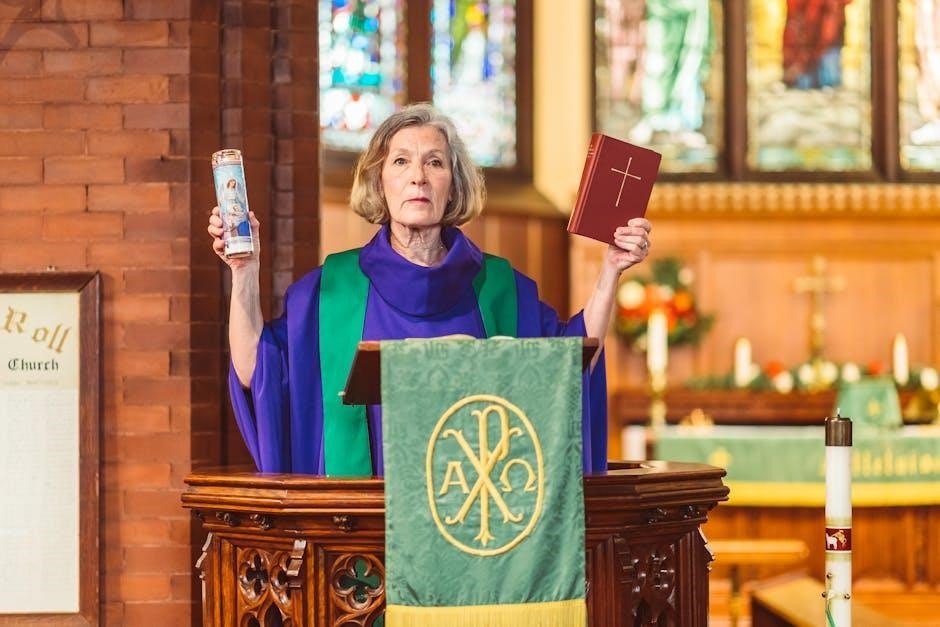
Final Preparations and Reflection
Final preparations involve last lessons, rehearsals, and prayer, helping children reflect on their spiritual journey and readiness to receive the Eucharist for the first time.
8.1 Final Lessons and Rehearsals
The final lessons and rehearsals are crucial in preparing children for their First Holy Communion. These sessions review key concepts, such as the Mass structure and Eucharistic prayers, ensuring readiness. Rehearsals often include practicing the order of the Mass, reciting prayers like the Act of Contrition, and understanding the significance of receiving the sacrament. Children also learn proper etiquette, such as bowing, genuflecting, and reverently receiving the host. These rehearsals help build confidence and familiarity with the ceremony. Parents and instructors emphasize spiritual preparation, encouraging reflection on the sacrament’s meaning. The final lessons also cover practical aspects, like dressing appropriately and participating actively. This phase ensures children are both spiritually and logistically prepared for their special day.
8.2 Spiritual Reflection and Readiness
Spiritual reflection is a vital part of preparing for First Holy Communion, fostering a deeper understanding of the Eucharist’s significance. Through prayer and contemplation, children develop a sense of reverence and gratitude for the sacrament. Families are encouraged to participate in Mass, reflecting on the Liturgy of the Eucharist and the transformative power of the sacrament. This phase emphasizes the importance of a contrite heart and the need to receive Communion with intention and devotion. Reflection activities, such as journaling or meditative prayer, help children connect with the spiritual dimensions of the Eucharist. This readiness ensures they approach their First Holy Communion with a mature and heartfelt disposition, ready to embrace the grace it offers.
First Holy Communion preparation is a sacred journey, fostering spiritual growth and deepening faith. It culminates in a joyful celebration, marking a lifelong commitment to Christ.
9.1 The Significance of First Holy Communion Day
First Holy Communion Day is a sacred milestone in a child’s spiritual journey, marking their first reception of the Eucharist. It symbolizes their deeper union with Christ and the Church, fostering a lifelong commitment to faith. The day is celebrated with solemnity, often accompanied by prayer, hymns, and rituals. Families and communities come together to support the child, making it a joyous and memorable occasion. The Eucharist, as the source and summit of Christian life, strengthens the child’s relationship with God. This day is not just a ceremony but a profound spiritual encounter, embedding faith values and inspiring a path of love, service, and devotion. It is a celebration of grace, unity, and the child’s growing role in the Catholic community.
9.2 Continuing the Spiritual Journey
First Holy Communion marks the beginning of a lifelong spiritual journey. It is essential for children to continue nurturing their faith through regular prayer, reflection, and active participation in Mass. Families play a vital role in fostering this growth by modeling Christian values and encouraging ongoing religious education. The Eucharist remains central to this journey, serving as a source of strength and guidance. As children grow, they are called to deepen their understanding of Christ and His teachings, living out their faith in daily life. This journey is not solitary but supported by the Church community, helping them develop a deeper relationship with God and a commitment to serving others.
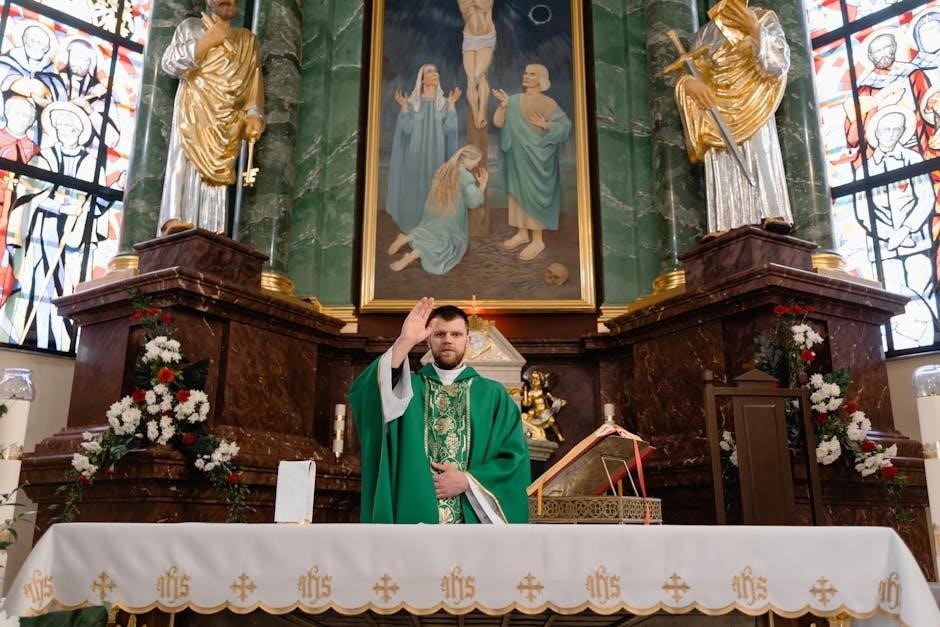
Additional Resources
Explore recommended prayer books, online guides, and PDF materials for comprehensive preparation. These resources offer detailed lessons, prayers, and references to enrich the First Holy Communion journey.
10.1 Glossary of Terms
Here is a list of key terms related to First Holy Communion preparation:
- Eucharist: The sacrament in which bread and wine become the Body and Blood of Christ.
- Sacrament: A ritual in which God’s grace is bestowed through sacred actions.
- Holy Communion: The act of receiving the consecrated bread and wine.
- Mass: The liturgical celebration where the Eucharist is consecrated.
- Adoration: Reverent prayer before the Blessed Sacrament.
- Reconciliation: The sacrament of forgiveness before Communion.
- Consecration: The prayer that changes bread and wine into Christ’s Body and Blood.
- Sacred Vessels: Objects like chalices and patens used in the Mass.
- Liturgy: The official worship service of the Church.
These terms are essential for understanding the preparation and celebration of First Holy Communion.
10.2 Further Reading and References
For deeper understanding, explore these resources:
- First Holy Communion: A Guide for Parents and Children by [Author Name], offering practical insights and activities.
- The Eucharist: A Sacrament of Love, detailing the theological and spiritual aspects of the Eucharist.
- Preparing for First Communion: A Child’s Journey, featuring interactive lessons and reflections.
- Liturgical Ministry and the Mass, explaining the roles and rituals within the Mass.
- Online PDF guides like First Holy Communion Preparation Lessons, providing structured lesson plans.
These resources enrich the preparation process, offering spiritual, educational, and practical support for children, parents, and educators.